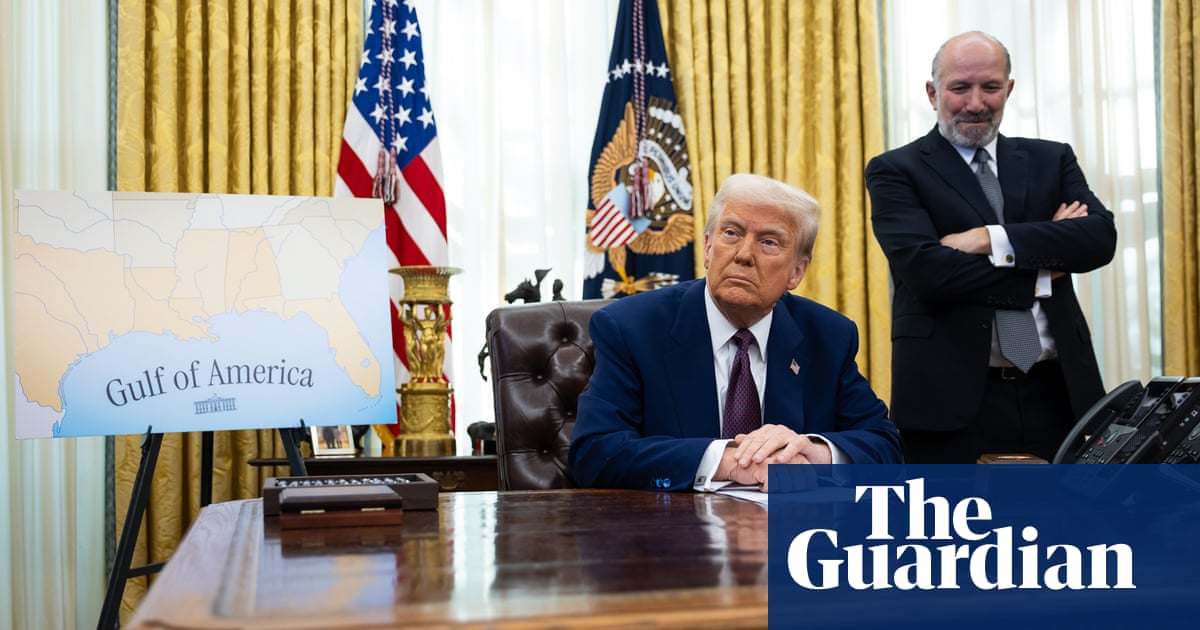The White House has announced that it is indefinitely blocking Associated Press journalists from accessing the Oval Office and Air Force One amid a growing standoff between Donald Trump’s administration and the news agency over the Gulf of Mexico’s name.
White House deputy chief of staff Taylor Budowich made the announcement on X, saying: “The Associated Press continues to ignore the lawful geographic name change of the Gulf of America. This decision is not just divisive, but it also exposes the Associated Press’s commitment to misinformation.”
Budowich went on to accuse the 175-year-old news wire agency – whose style guidance is used by thousands of journalists and writers globally – of “irresponsible and dishonest reporting”.
Budowich said he recognized that the Associated Press’s reporting is covered by the US constitution’s first amendment, which provides for the freedoms of speech and press. But he maintained that “does not ensure their privilege of unfettered access to limited spaces, like the Oval Office and Air Force One”.
He added that Associated Press journalists and photographers would retain their credentials to the White House complex.
According to the Hill, an Associated Press journalist was barred from attending an executive order signing ceremony in the Oval Office on Friday afternoon following the White House’s announcement.
The outlet reports that a White House official told the Associated Press journalist, “No, sorry,” when the reporter tried to join the event.
Friday’s announcement from the White House marks an escalation in the growing feud between the Trump administration and the Associated Press over the organization’s refusal to abide by Trump’s preference for Gulf of America and change its style on that body of water to Gulf of America.
On Tuesday, the Associated Press said another one of its journalists was refused entry into an executive order signing ceremony at the Oval Office – a move described by the news agency’s executive editor Julie Pace as an attempt by the White House to “punish” the organization for its independent journalism.
“Limiting our access to the Oval Office based on the content of AP’s speech not only severely impedes the public’s access to independent news, it plainly violates the first amendment,” Pace said.
After Tuesday’s episode, Pace sent a letter to the White House, calling the White House’s decision an “alarming precedent”.
A separate statement from the New York Times said it stood by the Associated Press while “condemning repeated acts of retribution by this administration for editorial decisions it disagrees with”.
“Any move to limit access or impede reporters doing their jobs is at odds with the press freedoms enshrined in the constitution,” said the statement, which was reported by chief CNN media analyst Brian Stelter.
According to a 23 January style memo, the Associated Press said that it would not be changing its style on the Gulf of Mexico to Gulf of America after Trump’s decision to change the body of water’s name – a move which holds authority only within the US’s federal government.
“The Gulf of Mexico has carried that name for more than 400 years. The Associated Press will refer to it by its original name while acknowledging the new name Trump has chosen. As a global news agency that disseminates news around the world, the AP must ensure that place names and geography are easily recognizable to all audiences,” the Associated Press said.
Blocking the Associated Press’s access around Trump could substantially affect news consumption in certain markets.
The Associated Press provides reporting to a numerous publications across the US that do not have their own reporters covering the White House.
Supporters of Trump could also use the White House’s decision to limit access for Associated Press journalists as evidence for bad-faith arguments that the organization is unpatriotic or untrustworthy.







